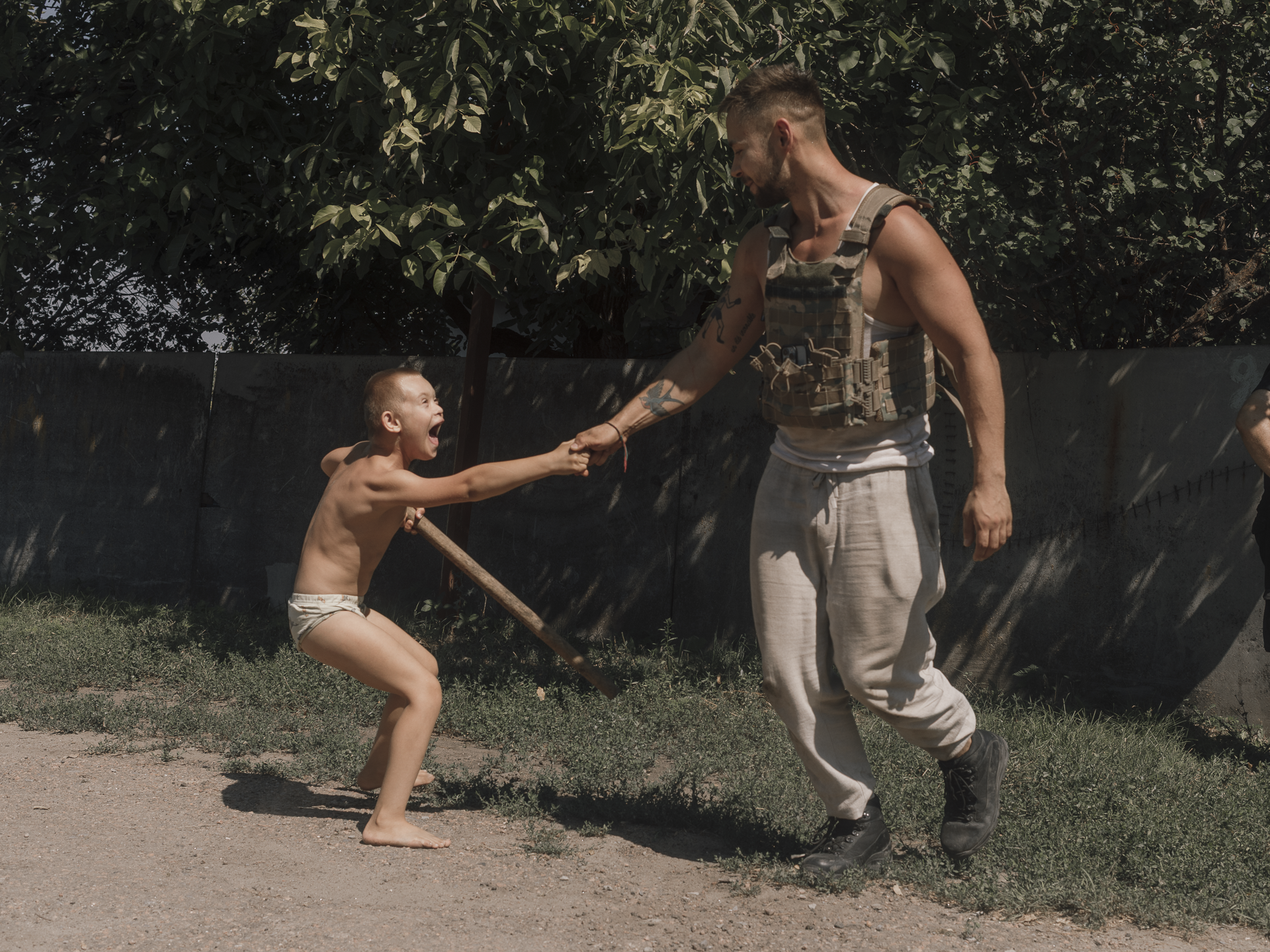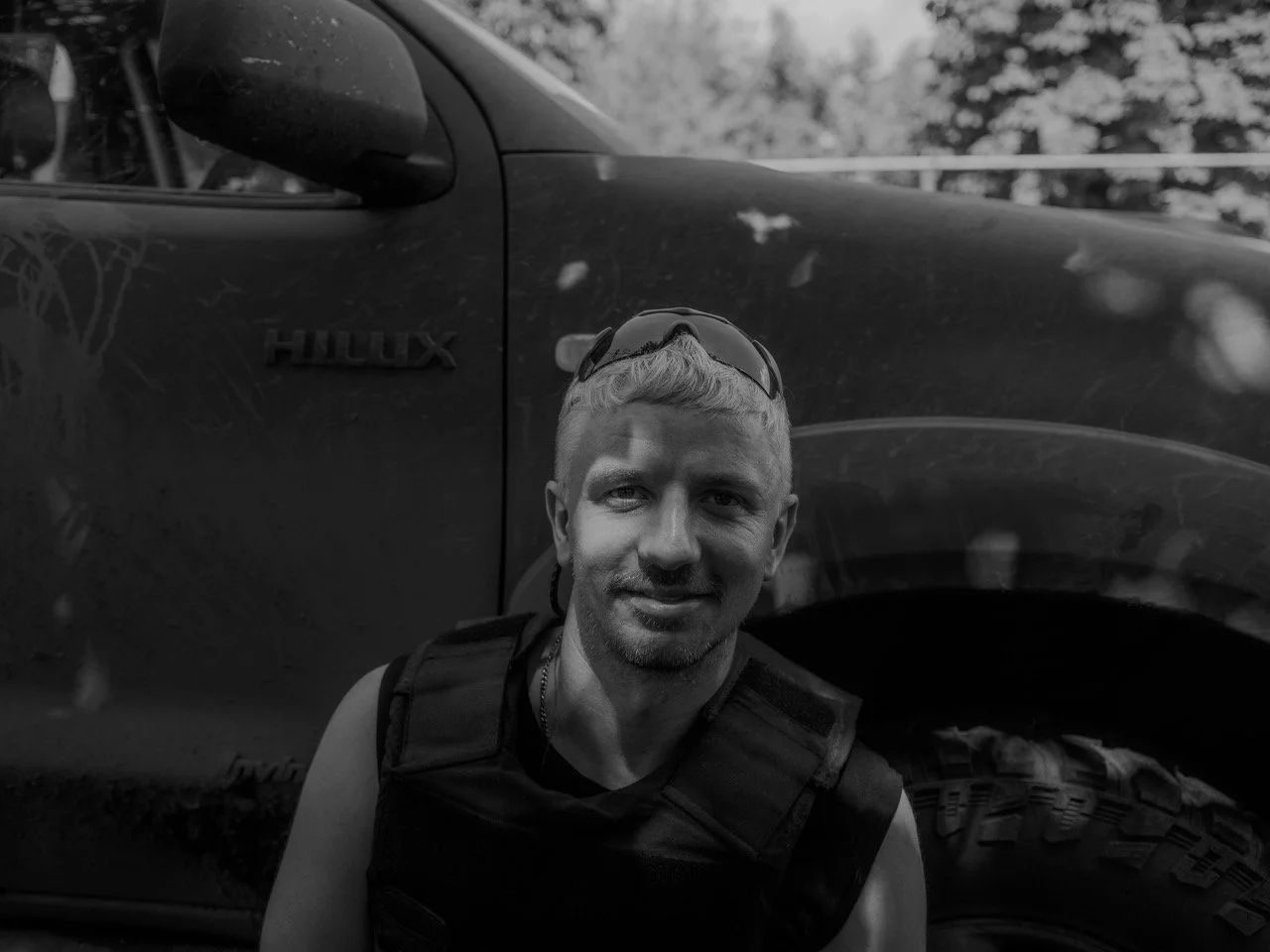YA OKAY
A mild night in the Ukrainian winter, the temperature is just above freezing point, the sky is cloudy, and occasional stars are making their way through the cloud layer.
The atmospheric masses are at a standstill. On the night of February 24, 2022, there is a dull night over the entire Ukraine. In Odessa, the blue-grey light of a laptop illuminates the windows of a house on Lymann Street. Anna is observing the airspace using an app. She notices no more planes over Ukraine. She goes to sleep. It’s 4 a.m. A few moments later, the first explosions of Russian missiles tear her out of her dreams – and with her, the entire Ukrainian nation. Her homeland is attacked, and with it, the hopes and dreams of many; she is now at war.
Instantly, the flow of time changed; the change of days of the week is perceived only conditionally, and everything merges into one long day. Memory content is what subjectively stretches our time duration, explains Marc Wittmann from the Institute for Frontier Areas of Psychology.
Time passes differently; it behaves relative to the observer.
The Ukrainian population experiences many processes of adaptation during this time, and it goes through phases of transformation: shock, denial, fear, but also acceptance. Everyday routines are broken in the social and public spheres and sometimes overwhelmed by emotional states. Some impressions are difficult to put into words; they are unspeakable things, they are the things that others do not want to know, cannot understand. Does the psyche find peace even when the war is over?
“Only the dead have seen the end of war,” the American philosopher, George Santayana, argued in his book “Soliloquies In England And Later Soliloquies” published in 1922. The experience of living in a war-torn country is impossible to put into words.
Sometimes people from abroad ask how it feels to experience the war: “How are you?” they ask.
“I’m okay,” replies Misha, a volunteer from Lviv, or Hlib, a DJ from Kyiv, or Andreyi, a soldier on the front line. Ya okay.
Dima, Sasha and VItali, who are part of a bomb and mine disposal team of the Ukrainian Army, extinguish the fire in a field near Makariv, which was caused by a demolition of a previously shot down helicopter of the Russian Army. When Russian forces withdrew from northern Ukraine, they had hidden booby traps and improvised explosive devices in food, trunks, washing machines, doorways, hospital beds, and even in the bodies of those killed in the invasion, but in this case the helicopter‘s missiles had to be rendered harmless. 27. April 2022 Makariv, Ukraine
On 26.02.2022 a long-range missile of the Russian army hit a civilian residential building in the Solomensky district of Kyiv. As a direct result, floors 17 to 21 were destroyed and the apartments caught fire. There is currently concern that floors 22 and 23 may collapse, bringing down the 24-story building on Valeriya Lobanovksogo avenue. Six people were injured in the attack. Saturday, 16. April 2022
A US couple orders a child from a Ukrainian surrogacy agency. The girl is born sick, and her parents reject her. Today Bridget is six, another American Family wants to adopt her, but now there is war, they set off for Ukraine to attend a court hearing in Zaporizihzia and get Bridget out of country. In the scene, Phil and Bridget are in a stairwell inside a hotel during an Air Raid in Lviv. Saturday, 30. April 2022 Lviv Oblast, Ukraine
A Portrait of a FPV Drone Operator call sign "Kakao" from the 25th Brigade. The front town of Pokrovsk is considered one of the most contested sections of the front and its location is particularly important for logistical reasons. 12. December 2024 Pokrovsk Region, Ukraine
The table of a volunteer from Kharkiv who evacuated 300 people from the north of Kharkiv during heavy fighting. The stun gun belonged to a Russian policeman who used it to attack Ukrainians. The stun gun is so powerful that people sometimes lost consciousness for two minutes when attacked with it, which is why the Russian troops then switched to just hitting people with the stun guns. 22th February, 2023 Kharkiv Ukraine
A Portrait of Max before he plays at Nightclub durin the Day. Max lives as a freelance tattoo artist, graphic designer and DJ in Lviv. 21th July 2023, Khmelnytskyi Ukraine
The funeral of Yuri Ruf and Taras Kryt who were killed due to artillery fire in the Luhansk region, in Lviv. || Yuri Dadak, called Yuri Ruf, was a social activist, writer and founder of the NGO „Spirit of the Nation“. He died in a battle in the Luhansk region against the Russian occupiers as a member of the 24th separate mechanized brigade named after King The funeral of Yuri Ruf and Taras Kryt who were killed due to artillery fire in the Luhansk region, in Lviv. || Yuri Dadak, called Yuri Ruf, was a social activist, writer and founder of the NGO „Spirit of the Nation“. He died in a battle in the Luhansk region against the Russian occupiers as a member of the 24th separate mechanized brigade named after King Danylo. He is survived by a wife and two daughters. 9th April 2022, Lviv Ukraine
Diana 8 years old, in front of her grandparents‘ house in Donbas. Diana was forced to leave her home in a Village, only 3 Km away from the Frontline. When she arrived at a supposedly safe place in Ukraine, the children began to call her a „separatist“. She replied to them that her father fought for the country in Bakhmut. Now her father is dead. 2nd August 2023, Markove Ukraine
Kuba, a Polish volunteer & Frontline Evacuator, tries to convince Sergej, an 8-year-old child with Down Syndrome, and his parents to come with him. Sergej and his parents live extremely close to the frontline and the situation is getting worse every day, but they refuse to leave. 5th August 2023, Zakitne Ukraine
Misha and Lupiko spend time together and try to bring a little normality into their lives. Even in wartime, the guys who ran a nightclub before the war, meet, show each other the latest records or work as tattoo artists. Currently, however, they do not want to throw parties out of respect for the troops at the front. In addition, all of them are active as volunteers and organize tactical equipment and medical aid for the Ukrainian troops. 1st May 2022, Lviv Ukraine
Hlib in his Room in central Kyiv. While many Ukrainian men volunteer for military service, Hlib is still hesitant and does not feel ready for service at arms, which at the same time leads to great feelings of guilt towards his country and fellow people. 9th March 2023. Kyiv Ukraine
A dead horse on a country road next to Hostomel were the Antonov Airport is located, a major international cargo airport located 10Km away from Kyiv. The Airport was one of Russias first Targets during the Invasion. 19th April. Hostomel, Ukraine. 2022
Bohdan (alias) poses with a Banderas mask on his bed in his apartment in Lviv. Stepan Bandera, who was murdered by Soviet intelligence agents in West Germany more than 60 years ago, is probably the best-known Ukrainian nationalist. For parts of Ukrainian society, Bandera is a hero and role model. Russian propaganda portrays him as an enemy whose supporters it has been fighting for decades. 6th May 2022, Lviv Ukraine
Barbershop 20km away from the Pokrovsk Frontline in Donbas. Old weapons decorate the shop while Soldiers and Civilians get their Haircut. 13th December 2024. Dobropilja, Ukraine.
Girls dancing on a Rave in Kyiv during wartime. After a long internal debate with the actors of nightlife in Kyiv, events are taking place again. The condition: A part of the proceeds is voluntarily donated to the army. While air alarm sirens can be heard outside, Kyivs underground can turn the day into night and escape their reality for a couple of hours. 11th March 2023, Kyiv Ukraine.
„You don‘t kill your brother. You don‘t rape your sister. You don‘t destroy your friend‘s country. That‘s why today we dismantled this monument once created as a sign of friendship between Ukraine and Russia.“ Statement of Mayor Klitschko on Twitter. In this Scene, the head of an monument in Kyiv. 26th Aprl 2022, Kyiv Ukraine
Bartosz Ludwinski
Bartosz Ludwinski (born in 1983 in Szczecin, Poland) came to Germany with his parents at the age of 5, where he spent his childhood and youth in Münster. After breaking off his training as an IT specialist, he increasingly devoted himself to photography.
Through his work as a DJ and event organizer, Bartosz documented German nightlife and its international personalities for many years. His outstanding interest in people in tense situations led him to Palestine and Ukraine, but also to the controversial Hamburg G20 summit and Germany’s last open-cast mine.
Ludwinski lives and works in Hamburg. His artist portraits and reportages have appeared in Der Spiegel, Die Zeit, NZZ, and Liberation, among other publications.

















